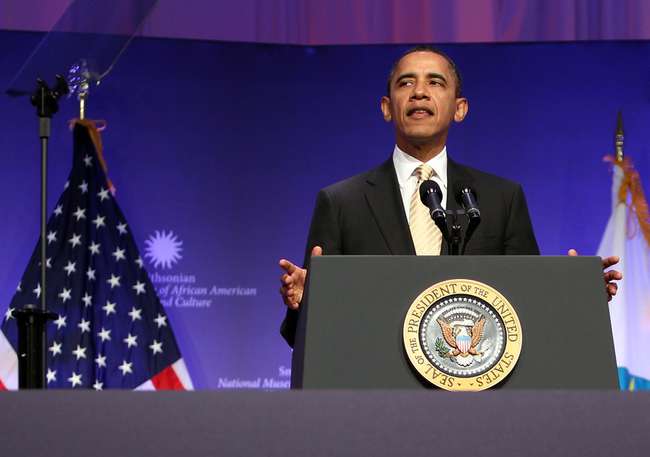
When president Barack Obama held a state dinner for British Prime Minister David Cameron last year, the luminaries at the head table included Warren Buffett, George Clooney, and David Adjaye. Not long after, the British press began referring to Adjaye as the president’s favorite architect.
At the time, there was no talk of an Obama presidential library—the election was still months away, and the president had reportedly told friends he didn’t want a library. But in January, the New York Times’s Jodi Kantor reported that Obama had changed his mind and that a former aide had been scouting locations. Since then, speculation has flourished about where the library will be built and who will be asked to design it.
The “where” is still a question mark, with Chicago considered likely. But the “who” appears less of a mystery, because the only name being mentioned is Adjaye. The architect himself hardly denied rumors that he was the front-runner. Asked at a recent gallery opening whether he was going to design the presidential library, Adjaye responded, “I can’t talk about that. I’ll get in too much trouble.”
Adjaye (who was born in Tanzania) shares more than African roots with the president. A few weeks before the state dinner, they shared the stage at the groundbreaking for the National Museum of African American History and Culture, which Adjaye designed (with Davis Brody Bond and Freelon Group). Obama is no doubt also aware of Adjaye’s deep connection to libraries; his most prominent U.S. projects include two public libraries, both within a few miles of the White House.
Presidential libraries will be very much in the news when the George W. Bush Presidential Library and Museum, designed by Robert A.M. Stern, opens in Dallas on May 1. Undoubtedly, the press will criticize the cost to taxpayers of what many consider vanity projects. Though the libraries are built with private funds, they are maintained by the federal government.
The University of Chicago, where both the president and the first lady have worked, is lobbying hard to be the site of the Obama library. Susan Sher, a former chief of staff to the first lady, is now an executive vice president at the university’s medical center and, according to the Times, the person charged with making the university’s case. Asked for a comment, Sher e-mailed an official statement that concluded: “It is premature to discuss a presidential library.” But it wasn’t premature for University of Chicago political-science professor Charles Lipson to raise concerns about the problems of having a presidential library—which can have partisan elements—at a university. Or for the university to create a faculty committee, chaired by constitutional-law professor Geoffrey Stone, to “offer advice on how best to coordinate the possibility of such a library with the interests of the University,” as Stone wrote in an e-mail. Among the possible sites, according to news reports, are the 37 acres that housed the Michael Reese Hospital, which was demolished between 2009 and 2012. One potential hiccup: the first family may return to their Hyde Park house in 2017 and may not want to draw tourists to a site so close to their actual home.
It would be unusual for a non-American to design a presidential library. But that probably wouldn’t deter President Obama from choosing Adjaye, a British citizen who spends a large percentage of his time in New York and Washington, especially if the African American Museum is well received when it opens in 2015. The White House press office did not respond to an e-mail requesting comment on a possible site or architect for an Obama library.
Adjaye Associates' response:
March 19, 2013
I was deeply disappointed to read Fred Bernstein’s story on a supposed presidential library (March 18) implying that I might have prior knowledge of such a project. The article is based on pure conjecture and I would like to emphasize that I have been misquoted if my remarks suggest otherwise. I have no involvement in such a project and I take issue with the misleading nature of this piece. Obviously, if in the future there was such an opportunity – we would be delighted and honoured to be considered.
David Adjaye




Post a comment to this article
Report Abusive Comment